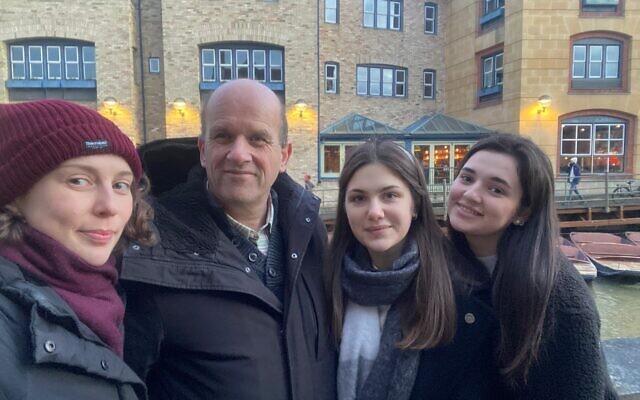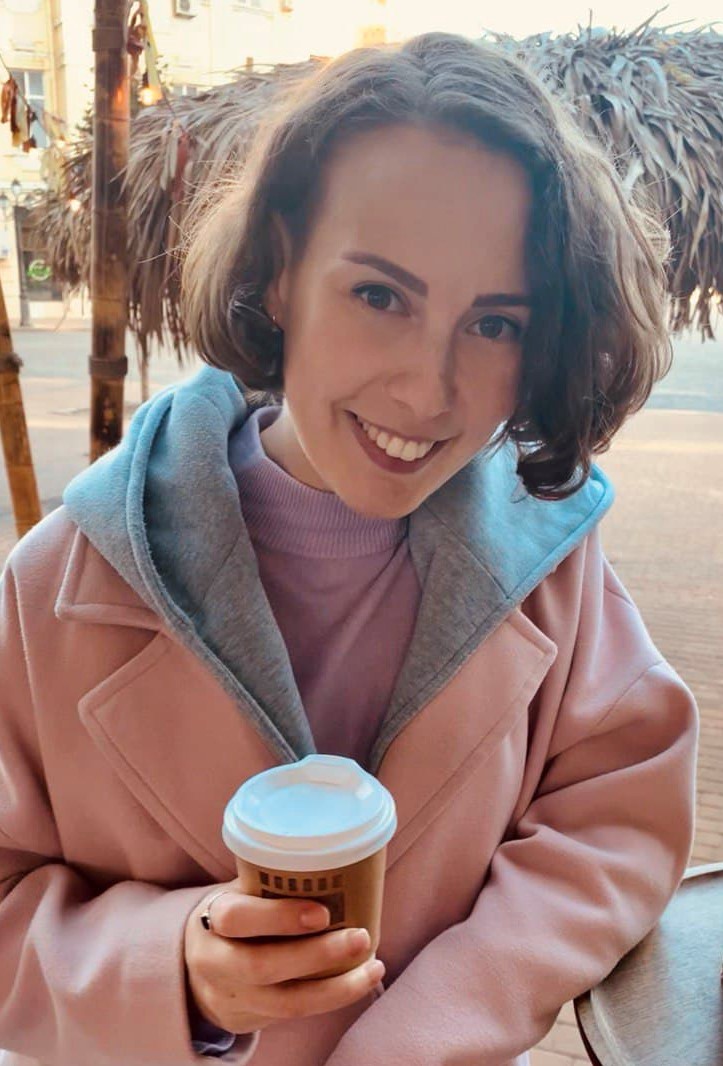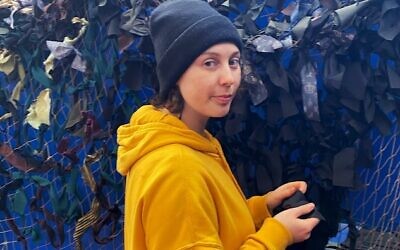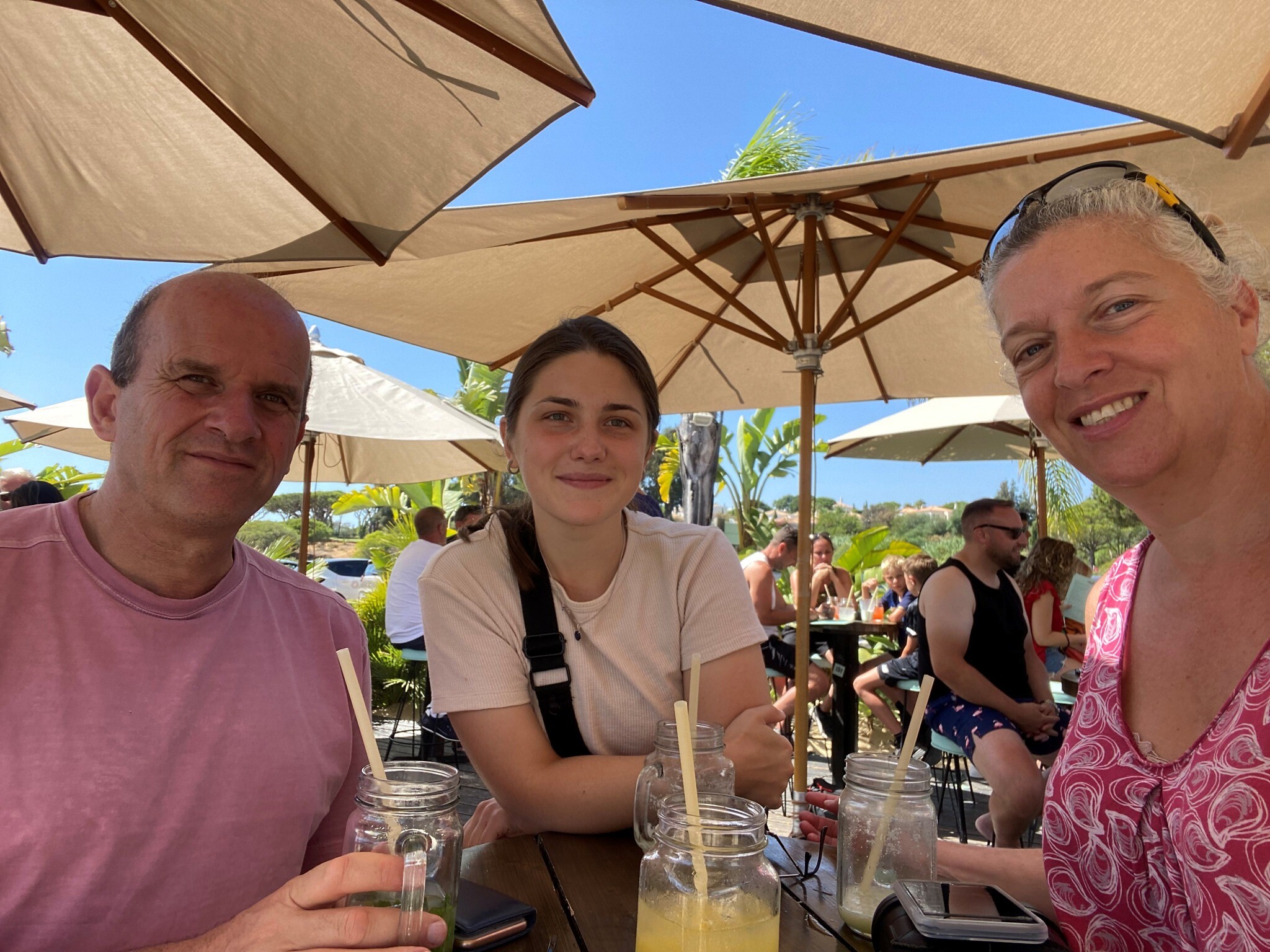One year on, Ukraine refugees are still coming to the UK
Rabbis are among host families who have made it possible for Ukrainians to live out the war here but they still long for home
Jenni Frazer is a freelance journalist

Elena Izmailowa opens the door of a comfortable-looking house in Finchley. The street is quiet and clearly home to well-off residents: many houses have a charging point for the owners’ electric cars.
Five weeks earlier, Elena, 33, was still living in Odesa, Ukraine’s main port city, where if there were any electric cars it’s hard to imagine them in use, because after Russians began to destroy Ukrainian power plants and transformer stations, she tells me, “we only had two to three hours of electricity a day. It’s not enough”.
Speaking to Elena in the days preceding Holocaust Memorial Day, it was not difficult to draw a painful parallel between the middle-class Ukrainians whose present-day lives have been utterly disrupted by last February’s Russian invasion, and those middle-class European Jews of the 1940s, who regarded their Nazi occupiers with similar disbelief.
The most immediate result of Putin’s invasion of Ukraine was that “we all lost our jobs.” By “we”, she means her immediate family – her husband, Sergiy, who is a 3D designer in architecture, her father-in-law, who is an artist, her mother-in-law, who sold his paintings, and herself, who worked as a photographer in advertising and marketing. “But none of these things matter when there is war.”
Elena, however, had other skills, specifically as a community worker. She was, and still is, the chair of the Odesa Reform community, Shirat ha-yam, with which Edgware and Hendon Reform Synagogue has been twinned for nearly 15 years. Both synagogues are part of the World Union for Progressive Judaism. She grew up in this community and was one of the main leaders of Ukraine’s Netzer youth movement, for many years organising summer camps and much more. She was also the organiser of Odesa’s Mitzvah Day.
But – although Jews did leave Ukraine in large numbers when the Russians invaded in February 2022 – Elena does not draw a distinction between the attitude of young Ukrainian Jews and her non-Jewish friends. Though there are people in the older generation, she says, who still support Russia “because they thought the USSR was great”, and also those who have bought into “the Russian propaganda machine”. But for Elena and her generation, the response has been one of “real patriotism”, born of a realisation that if they do not resist the Russians, “then it is over for Ukraine. People are highly motivated to protect the land and their homes. If we don’t stop Putin now, it will be the end for our children.”

Elena’s husband, who had no previous military experience, is at the bottom of the food chain for army service. But like all Ukrainian men who would be eligible for service, he is not allowed to leave the country. So inside the immediate family, as the war raged on, there was intense discussion as to how to face the future.
“We had no jobs, except for volunteering to help soldiers and other people in Odesa”, Elena says. “It wasn’t an easy decision to leave my husband” — in May the couple will have been married for just four years. So, in as much as there was any plan at all, she took the difficult step of leaving, in mid-December 2022.
“You don’t have a future”, she says, sadly. “You’re inside the situation and you can’t change anything. You cannot have a plan. Maybe we say we’ll go to the street market tomorrow, but then there is a bombing and we have to cancel. So we thought about this for a long time, what to do. We need to work. And despite financial support from the World Union of Progressive Judaism, food prices are going up all the time and there is a strong chance that we will soon not have enough money for food for our family. It’s very scary, we don’t know what will be.”
In December, when Russia attacked Ukraine’s power plants, and electricity was reduced drastically, Elena found she couldn’t even carry out her volunteer work. “I didn’t have internet or light, and immediately after the bombing only partial heat and water. We are lucky in Odesa, I know other places have it worse, but it’s just really difficult to work”.
Ukrainian society has changed, Elena believes. “I don’t know what will happen after this war. Our economy is already in a very bad state – and what my husband and I will do professionally in Ukraine… we just don’t know. There are so many ‘ifs’ – if we will be part of NATO, if we will be part of the European Union, if we will kill our corruption system: if, if, if. I love my country – but I still don’t know.”

She came to Britain because she speaks good English – and is improving it all the time. And she had contacts here because of the twinning with EHRC, which she visited 10 years ago. “My goal is to get a job so that I can support my family, members of my community and my country. And for me, it’s really important to continue my Jewish life – my normal Jewish life”. She speaks warmly of her gratitude to her British hosts, Melinda and Daniel Shaw.
Shirat ha-yam —the Song of the Sea, so-called because the Odesa Reform community overlooks the sea harbour of the city — is a small-ish congregation of about 200 people. Elena describes it as a lively and close-knit “family” community, with an active teen Netzer youth movement and a regular Hebrew school.
Its rabbi, Julia Gris, is, ironically, Russian-born, though she has lived and worked in Ukraine for 22 years, and has been Odesa’s rabbi for the last eight. Now, however, she has moved – with members of the community – to Oldenburg in Germany. “She really loves Ukraine,” says Elena of Rabbi Gris, noting that for the past year the German part of the Odesa community has held online services, together with those who stayed in Ukraine.
I ask her about the Ukrainian president, Volodymyr Zelensky, and it is no exaggeration to say that Elena lights up with joy when she speaks of him. “I LOVE him”, she declares, “he is my hero. I believe he is a gift to us (Ukrainians). For me, he is the Maccabee of our days. What’s happened to us is really close to the Chanukah story. We are a small country – and we will fight, like the Maccabees, until our victory”.
She voted for Zelensky when he ran for president. What she admires about him, she says, casting around for the right English word, is that he is “stubborn”. He refuses to sit in meaningless talks with Putin; “‘I’m standing here because I believe in this. I’m not moving’.
“They [the Russians] bombed us, they raped us, they shot at us, and then they said, we need to deal. And Zelensky said no. No deal. Go away, leave our country, and then we can talk. I love that he has stayed strong for us. He’s not Putin, sitting in a basement. He’s so brave, he goes to all the hotspots”.
Elena probably did not have conversations about the strength of the Ukrainian army before February 2022. Now, however, she is fiercely determined that there will be a positive outcome if the world supports Ukraine with weapons and tanks. “We can do it. We will win. And everyone should understand that we are the umbrella for the civilised world. The price is huge. But I am waiting for our victory.”
Every week, says Elena, Russian bombs destroy civilian homes. One day, possibly, it could be the house next door to her family, one day some friends. “So how”, she asks me, “how can I plan?”
Rabbi Mark Goldsmith of Edgware and Hendon Reform Synagogue (EHRS) and his wife have hosted Anya for eight months. “Our Ukrainian guest, Anya, came to stay with us on 28 May 2022,” he says. “She is from Mariupol, a city in South Eastern Ukraine that was taken over by the Russians after a merciless bombardment early in the war. Anya spent more than two months in a basement bunker surviving on scraps of food, frequently without water or electricity, living the trauma of having to help bury people in the park where she had played as a child. Her boyfriend, Sacha, in Zaporizhzhia, helped her to escape through numerous Russian checkpoints. Through a network of local hosts, my wife Nicola and I were put in contact with Anya and were able to sponsor her for a visa to come to the UK.
“Anya was 21 and a student in her final year at Mariupol University. Following a train and bus journey through Lviv and Warsaw she took the first flight of her life and Nicola brought her home from Luton Airport. On her first day Anya noticed how much she was reacting to each domestic plane flying above as we sat in our garden in the sun. For three months planes had meant bombing attacks.

“She had brought with her a gift of a Ukrainian flag-coloured angel and a bar of Ukrainian chocolate with a picture of President Zelensky, both of which still adorn our mantelpiece.
“Having Anya live with us has itself been a gift. Over these eight months she has finished her degree online as Mariupol University decamped to Kiev. She has helped bring four other young people from Mariupol to safety here in the UK, to stay with Edgware and Hendon Reform Synagogue families and others. Having been a well-known student activist in Ukraine, she has been able to speak at synagogue and charity events in aid of Ukraine to help people know what her people continue to suffer every day. She has found an excellent job in international event management and is building her skills for when she is able to return home. She has begun to enjoy all the delights of London with her friends from Ukraine and with us as her host family.
“It is an extraordinary privilege, as a Jewish family, to be able to help a refugee from the Russian terror to continue her life, much as our forebears in our Jewish community were helped as young people by kind British families when they made it to England during the Nazi period. It did not work for all of them and we want to make sure it works for Anya.
“She is a strong woman, who had to leave her family behind in Mariupol, with only the occasional phone call now possible. Anya speaks daily with her supportive boyfriend Sacha who, at the age of 25 is neither able nor willing to leave Ukraine. Nicola and I are very proud of how Anya is working to overcome the trauma of having had her home and all she grew up with systematically destroyed by Russia. We are glad to host her until Ukraine is at peace again.”

Thank you for helping to make Jewish News the leading source of news and opinion for the UK Jewish community. Today we're asking for your invaluable help to continue putting our community first in everything we do.
For as little as £5 a month you can help sustain the vital work we do in celebrating and standing up for Jewish life in Britain.
Jewish News holds our community together and keeps us connected. Like a synagogue, it’s where people turn to feel part of something bigger. It also proudly shows the rest of Britain the vibrancy and rich culture of modern Jewish life.
You can make a quick and easy one-off or monthly contribution of £5, £10, £20 or any other sum you’re comfortable with.
100% of your donation will help us continue celebrating our community, in all its dynamic diversity...
Engaging
Being a community platform means so much more than producing a newspaper and website. One of our proudest roles is media partnering with our invaluable charities to amplify the outstanding work they do to help us all.
Celebrating
There’s no shortage of oys in the world but Jewish News takes every opportunity to celebrate the joys too, through projects like Night of Heroes, 40 Under 40 and other compelling countdowns that make the community kvell with pride.
Pioneering
In the first collaboration between media outlets from different faiths, Jewish News worked with British Muslim TV and Church Times to produce a list of young activists leading the way on interfaith understanding.
Campaigning
Royal Mail issued a stamp honouring Holocaust hero Sir Nicholas Winton after a Jewish News campaign attracted more than 100,000 backers. Jewish Newsalso produces special editions of the paper highlighting pressing issues including mental health and Holocaust remembrance.
Easy access
In an age when news is readily accessible, Jewish News provides high-quality content free online and offline, removing any financial barriers to connecting people.
Voice of our community to wider society
The Jewish News team regularly appears on TV, radio and on the pages of the national press to comment on stories about the Jewish community. Easy access to the paper on the streets of London also means Jewish News provides an invaluable window into the community for the country at large.
We hope you agree all this is worth preserving.





















